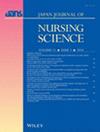Factors affecting the information and communication technology skills of nurses involved in home-visit nursing services
Abstract
Aim
This study aimed to clarify the factors affecting the information and communication technology skills of nurses involved in home-visit nursing services based on their attributes, computer self-efficacy, and attitudes and perceptions regarding information security risks.
Methods
A web-based survey was administered to 2000 visiting nursing stations. The survey items included nurses' information and communication technology skills acquisition status, basic attributes, computer self-efficacy, and attitudes and perceptions regarding information security. A multiple regression analysis (stepwise method) was performed with the dependent variable being information and communication technology skills acquisition status, and the independent variables being computer self-efficacy, as well as attitudes and perceptions regarding information security.
Results
In total, 205 responses were collected and analyzed. The factors affecting the acquisition status of information and communication technology skills were educational background, computer self-efficacy, and two scales regarding attitudes toward perceptions of information security risks (one scale regarding computer security education experience and another regarding perceived security cost).
Conclusion
The results of this study suggest that to improve the information and communication technology skills of nurses involved in home-visit nursing services, security-related measures must be considered, such as improving self-efficacy with computers, providing opportunities for information security education, and ensuring appropriate management of passwords, which are often neglected. However, the conceptual structure of an important element, computer self-efficacy, has only been clarified for other occupations. Therefore, clarifying nurses' conceptual structure is necessary in developing teaching methods to improve information and communication technology skills.

 求助内容:
求助内容: 应助结果提醒方式:
应助结果提醒方式:


